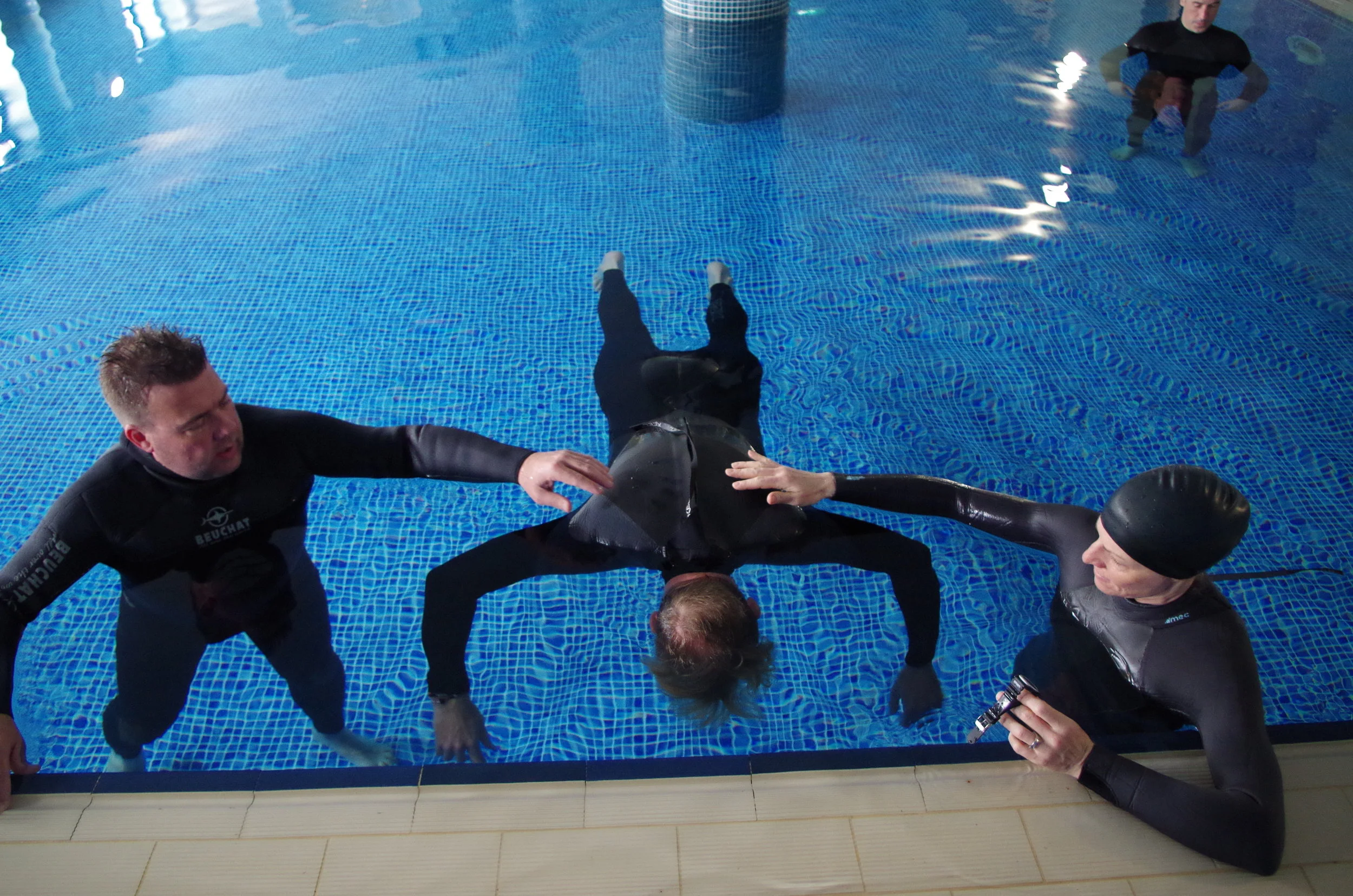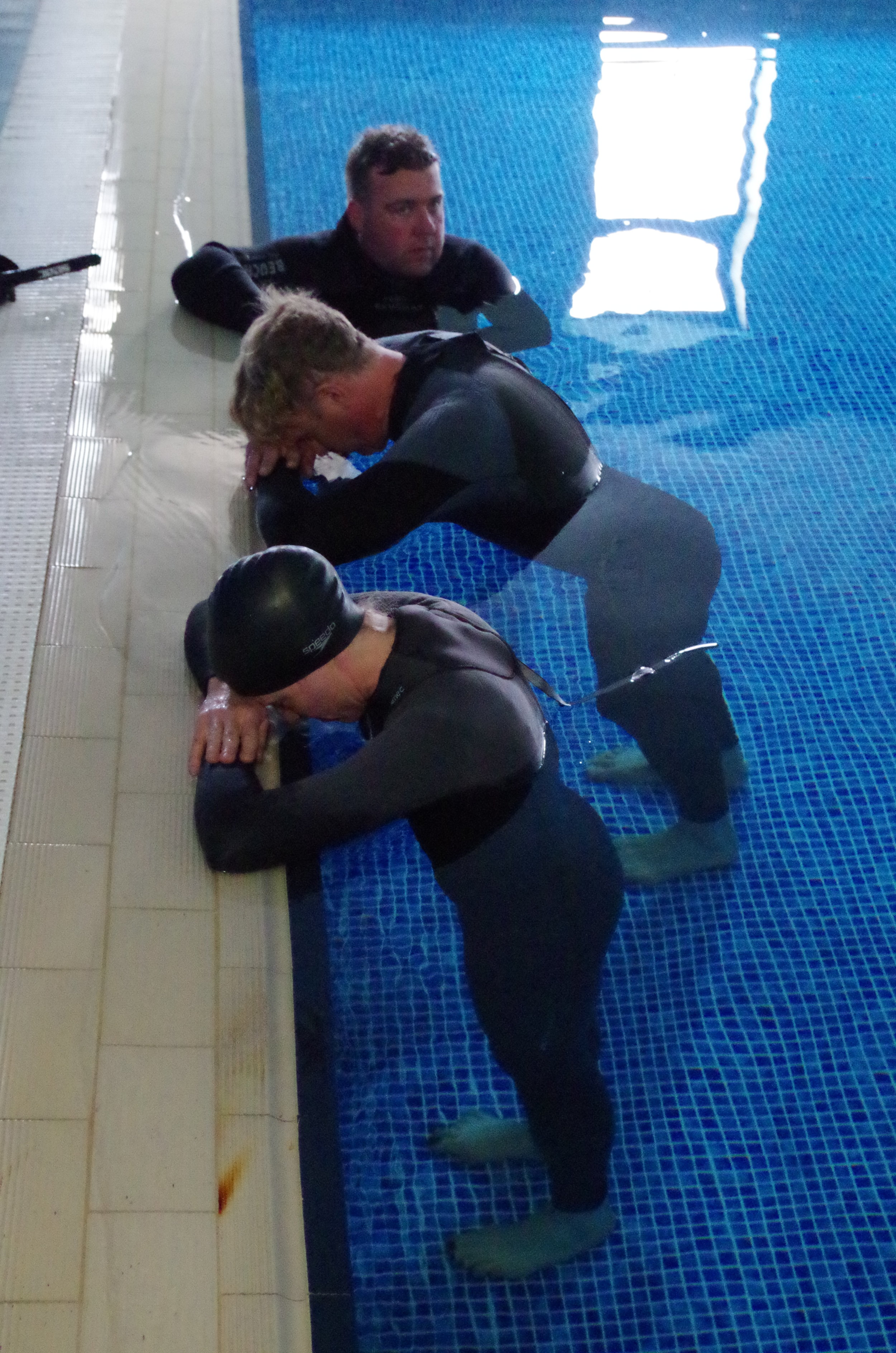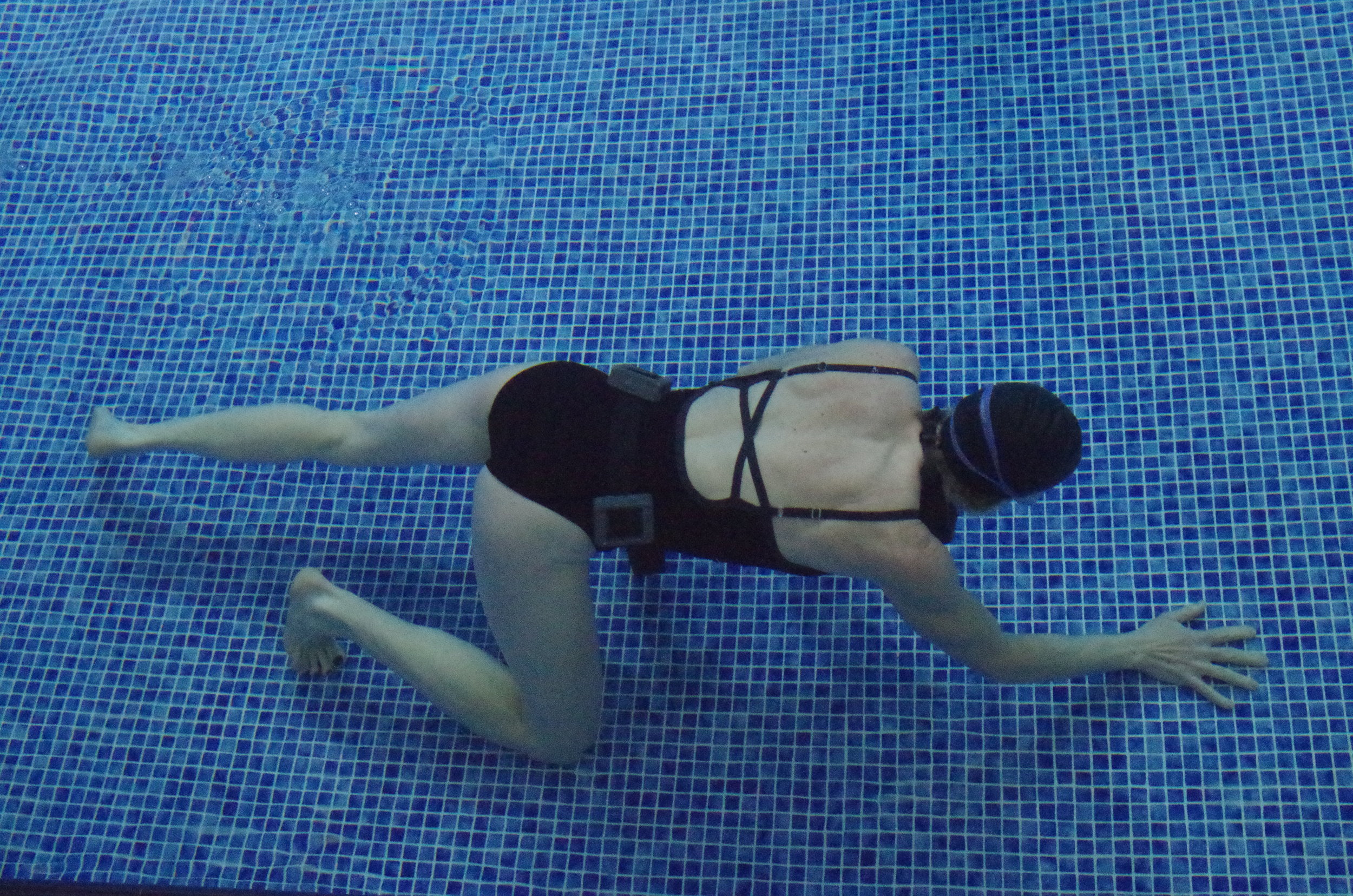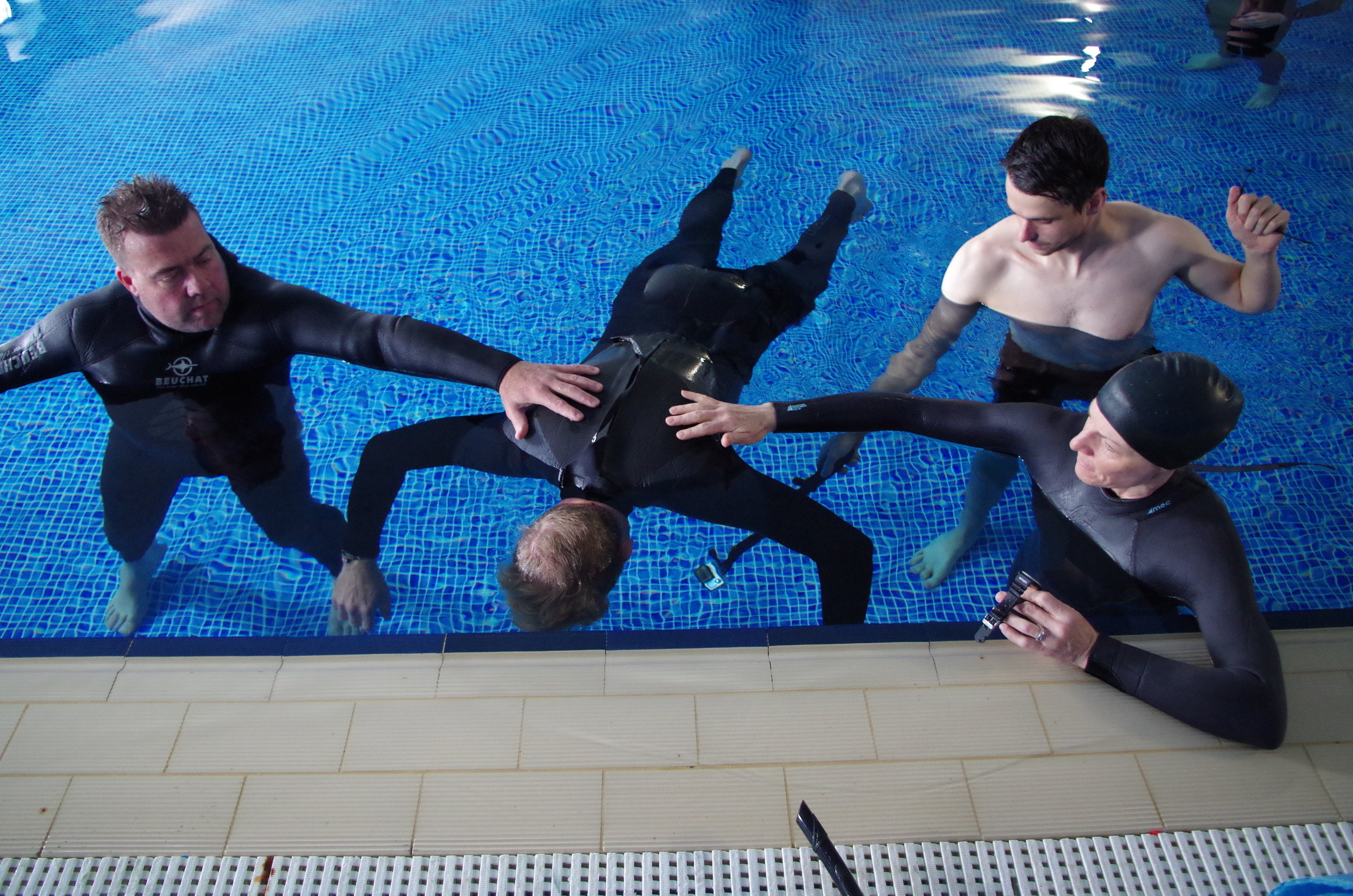Hold-downs & breath holds

Have you ever wiped out and been held down so long, time started to stretch before you like an unfurling narrowing tunnel? Ever felt submerged by panic as you thought you'd just run out of all your oxygen? You are still around to read this. Something must have worked out for you. I decided to learn the science behind good fortune and took a ''surfvival' course.
Oahu, 2014: wiping out on an innocuous wave at the end of a fun session, I was kicking back up when I felt something pulling me under just as I was about to reach the surface. 'Not funny!', I thought for a second before realising no one was hiding in the impact zone for a practical joke. Shark? I kicked frantically and then I realised: reef. The Velcro on my leash had suddenly become an impossibly complicated technology and with moving waters around me I was unable to remove it. Three waves under and past the fleeting thought that life was decidedly short and absurd, a name I didn't even know I knew surfaced: Mark Foo. With every second that passed, Mark Foo's name and tragic death whirled around my head in an increasingly suffocating chant. The water suddenly receded; I caught a desperate breath and sight of another surfer close by looking in my direction. When I went under again, I was calm: even if I passed out, I was certain he would get me. Suspended in time, hyper aware of every bubble around me and slowly letting go, I thought I felt the tension in my leash loosen... and then everything seemed to open up and a giant divine hand pulled me into the sunlight. Feeling disoriented, still murmuring Foo's name and submerged with gratitude, I looked to see the other surfer paddling to shore 50 yards ahead: he'd never really seen me, even less saved me, only fortune had. Or Mark Foo.
For me it was an epiphany: whenever I let go, nature does the hard work and I emerge intact. When I panic, my misspent energy comes in the way and death grins on the other side. Unfortunately the human brain is not able to process a negative, and the command 'don't panic!' invariably produces the opposite result. I knew I needed practical positive tips to better manage my hold-downs.
Sligo, 2017: at the Shore Shots surf film festival in Sligo, Ireland, I came across William Britton (of the celebrated local family that spewed Irish surf pioneer Brian Britton and big wave female surfer and adventurer Easkey Britton) who had designed a new 'surfvival' course. An AIDA instructor and surfer himself, William has refined the course with the input of local big wave surfers Conor Maguire and Barry Mottershead.
'People take different things away from the 'surfvival', William tells me. You could have a big wave surfer beside a beginner surfer. The surfer may want to push themselves and train for bigger breath holds, whereas the beginner just wants to get a bit more comfortable and realize their existing capabilities. I have people that are afraid to put their head underwater who finish the course with 3 minute holds. I feel I am giving people a superpower.'
There is life past those cramps!
The theory class is an eye opener: before the course, I thought freediving was all about absorbing more and more oxygen and somehow being spared the spasms and urge to breathe. Well people, there's good and bad news: the bad news is, it's all about mastering the cramps and living through them. The good news is, there is life past the cramps! Yes they are a warning signal, but they do not indicate that you've run low on oxygen, only that your levels of CO2 are increasing.
In order to increase your CO2 tolerance, there are exercises that you can do, referred to as 'CO2 tables', where you repeat cycles of breath-holds so that you work on maintaining the same duration of a breath-holding with higher levels of CO2. For safety reasons (we are talking life/death here), these exercises are best performed 'dry'. i.e. on land. If you must do them in the water, do a freediving course first and always always have a buddy: on land if you pass out, your breathing reflex will kick back in and you'll be ok. If you black out in water, you'll drown.
'The focus on skills, technique and safety gives people the comfort and confidence to push themselves safely into a completely alien environment' William says. So true! As a surfer, this was a key learning that helped me feel less scared when wiping out: my body still has enough oxygen to last under water when the urge to breathe starts manifesting itself. Which means the battle is more mental than physical.
We're all fish people, relax!
'We are meant to be down there, exclaims William. Just look at the natural changes our body goes through in water with the Mammalian Dive reflex!'
The mammalian Dive Reflex or MDR, is a physiological set of responses that alter the way our body operates under water: our heart rate slows down, blood is redirected to the vital organs and red cells are released into the blood stream. This kicks in as soon as the area on your cheeks/near your nostrils gets wet (hence splashing your face first being useful). Inversely if someone is pulled out of water after being held down, one of the first thing to do is to blow gently on their face to kick start the 'land' mode again in their body.
Knowing that your body already adjusts to being under water naturally, all that is left for us is to relax into it. 'Stress and panic eat oxygen so if you can stay calm, you have a longer and much nicer experience in the water' says William. This is easy enough to do in static apnea (less though at the end of a breath hold), but near impossible in a wipeout. Which is why I particularly enjoyed practicing simulated wipeouts on the course.
'A simulated wipeout in a pool could never compare to a hold down in a big wave spot, admits William, but when surfers can do a simulated wipeout and hold their breath for a further two minutes, it does a lot for their confidence and relaxation.'
'I go too easy on them in courses!' William sighs. True dat. When it's my turn to wipeout, the gentle push he gives me to tumble under water makes me feel like I am the queen of composure and the wipeout hardly dents my record. His colleague steps in: 'nah, that was too gentle, let me do it!'. He pushes me backwards which takes me by surprise, my nose fills with water and five seconds in I want to bolt out to the surface, filled with panic and anger. And then it hits me: quite often, these are the two overriding feelings I have when wiping out: panic, because I am caught off guard, I am not ready, I am at the end of a breath (lungs near empty). Self-directed anger because I feel I could have avoided the wipeout, I must have done something wrong. Both these emotions are extremely toxic in a breath hold situation. I try and slow my brain down, relax, but I have already burnt so much oxygen I halve my breath hold record time. I try a second time ('please don't be gentle!'), and while the wipeout goes in different directions and feels equally forceful, I manage 3/4 of my record by concentrating on relaxation. A complete revelation!
Breathing normally is safer
Before the course, my reference on freediving was the French classic film 'Le Grand Bleu', where record holder Jacques Mayol and friend do extended sharp inhaling and exhaling before their dive. This 'hyperventilation' technique was all the rage in the 80s but since got repudiated, for a very good reason: 'if you hyperventilate your oxygen can drop to blackout with little to no warning, explains William. The danger zone is when O2 (oxygen) is low but with low CO2 (carbon dioxyde) your body can't really tell that you are low on O2.'
In simple terms, hyperventilating gets rid of more CO2 than it can take on extra O2, so you don't really 'load up' and compensate. Having less CO2 will delay the moment you feel the urge to breathe. As you dive, your O2 levels get depleted, but the reflex to breathe isn't triggered as your level of CO2 are still too low. This explains why hyperventilation blackouts happen regardless of depth and can happen in a pool. If you are going to do any breathing exercises in water, always have a buddy with you! In the course, we were paired to time and check on each other every 30 sec, and it certainly allowed me to concentrate on relaxation and performance rather than worry about my safety.
Always surf with a buddy!
As a young Liverpudlian footballer you learn 'you'll never walk alone'. As a diver, you always go with a buddy with whom you exchange hand signals and learn to decipher facial and behavioural cues (excessive relaxation and smiles at the end of a long static breath hold are usually a prompt to get your buddy straight out of the water). Big wave surfer Jay Moriarty died on a solo freedive. He was highly trained, but no one was there to see what went awry on that sea bed in the Maldives.
Too often surfers go out alone or count on people in the line-up to somehow notice their disappearance. How often have you looked out for 'one of the too-many' that crowd your lineup or wondered whether they were back on the shore or dangling head down in a reef cave? Mark Foo's death in Mavericks certainly triggered a massive change in the big wave surfing culture: nowadays just as much preparation goes into safety, jet-ski pairing, rescue protocol and back-ups as goes into physical training or even life vests. When Greg Long nearly drowned in 2012 and questioned the limits of preparedness after he blacked out, he still owed his survival to planning and buddying. And one doesn't need to be surfing Cortes Bank or Mavericks to need help. Accidents too often happen on 'unremarkable wipeouts on unremarkable waves'. As I was struggling at the bottom of the ocean with my leash holding me down, the thought that the stupidity of my death just might be obscured by the fact it happened on the North Shore was of very little comfort. No one ever died of asking for help. Get over yourself, ask and look out for each other.
Freediving training improves your surfing!
Even though I only worked sporadically on my CO2 tables, the sheer knowledge that the urge to breathe isn't the end, coupled with relaxation techniques have been a game-changer for my surfing. Being less afraid to fall, I commit more often when I used to pull back. And hopefully I progress. I no longer view wipeouts as an open door to the kingdom of hellish death. Rather, they are now an opportunity to slow down, weigh life in, feel it in every limb and every cell, in and around me, and when the time comes to emerge, (I now find 9 times out of 10 it does come early enough), I truly celebrate that overlooked everyday beauty: a simple breath.
If you visit Ireland, book yourself a surfvival course with North West Adventures!
Chief Storyteller at Swellbound







